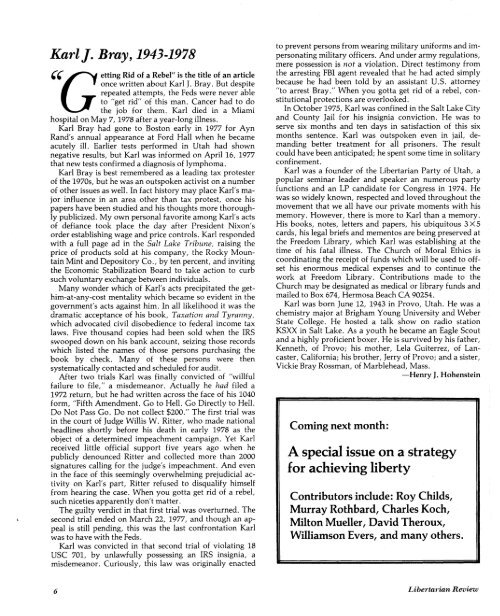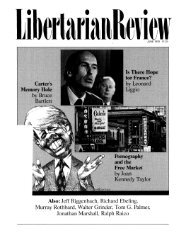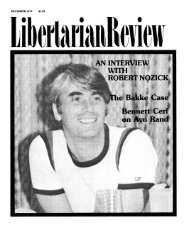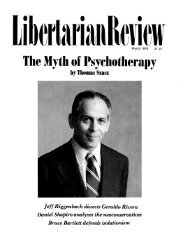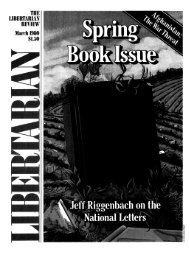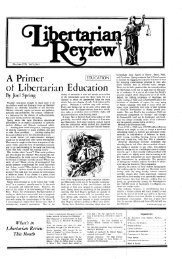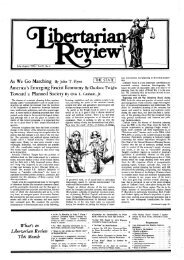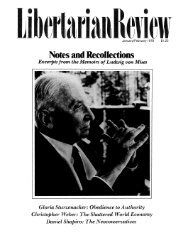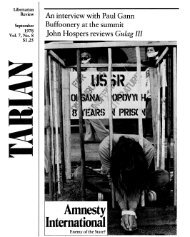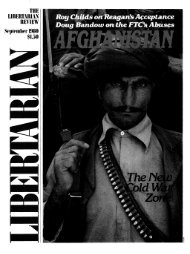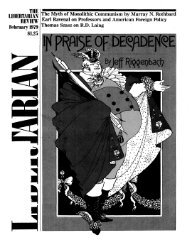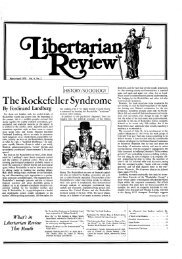The Libertarian Review July 1978 - Libertarianism.org
The Libertarian Review July 1978 - Libertarianism.org
The Libertarian Review July 1978 - Libertarianism.org
Create successful ePaper yourself
Turn your PDF publications into a flip-book with our unique Google optimized e-Paper software.
Karl]. Bray, 1943-<strong>1978</strong>"Getting Rid of a Rebel" is the title of an articleonce written about Karl J. Bray. But despiterepeated attempts, the Feds were never ableto "get rid" of this man. Cancer had to dothe job for them. Karl died in a Miamihospital on May 7, <strong>1978</strong> after a year-long illness.Karl Bray had gone to Boston early in 1977 for AynRand's annual appearance at Ford Hall when he becameacutely ill. Earlier tests performed in Utah had shownnegative results, but Karl was informed on April 16, 1977that new tests confirmed a diagnosis of lymphoma.Karl Bray is best remembered as a leading tax protesterof the 1970s, but he was an outspoken activist on a numberof other issues as well. In fact history may place Karl's majorinfluence in an area other than tax protest, once hispapers have been studied and his thoughts more thoroughlypublicized. My own personal favorite among Karl's actsof defiance took place the day after President Nixon'sorder establishing wage and price controls. Karl respondedwith a full page ad in the Salt Lake Tribune, raising theprice of products sold at his company, the Rocky MountainMint and Depository Co., by ten percent, and invitingthe Economic Stabilization Board to take action to curbsuch voluntary exchange between individuals.Many wonder which of Karl's acts precipitated the gethim-at-any-costmentality which became so evident in thegovernment's acts against him. In all likelihood it was thedramatic acceptance of his book, Taxation and Tyranny,which advocated civil disobedience to federal income taxlaws. Five thousand copies had been sold when the IRSswooped down on his bank account, seizing those recordswhich listed the names of those persons purchasing thebook by check. Many of these persons were thensystematically contacted and scheduled for audit.After two trials Karl was finally convicted of "willfulfailure to file," a misdemeanor. Actually he had filed a1972 return, but he had written across the face of his 1040form, "Fifth Amendment. Go to Hell. Go Directly to Hell..Do Not Pass Go. Do not collect $200." <strong>The</strong> first trial wasin the court of Judge Willis W. Ritter, who made nationalheadlines shortly before his death in early <strong>1978</strong> as theobject of a determined impeachment campaign. Yet Karlreceived little official support five years ago when hepublicly denounced Ritter and collected more than 2000signatures calling for the judge's impeachment. And evenin the face of this seemingly overwhelming prejudicial activityon Karl's part, Ritter refused to disqualify himselffrom hearing the case. When you gotta get rid of a rebel,such niceties apparently don't matter.<strong>The</strong> guilty verdict in that first trial was overturned. <strong>The</strong>second trial ended on March 22, 1977, and though an appealis still pending, this was the last confrontation Karlwas to have with the Feds.Karl was convicted in that second trial of violating 18USC 701, by unlawfully possessing an IRS insignia, amisdemeanor. Curiously, this law was originally enactedto prevent persons from wearing military uniforms and impersonatingmilitary officers. And under army regulations,mere possession is not a violation. Direct testimony fromthe arresting FBI agent revealed that he had acted simplybecause he had been told by an assistant U. S. attorney"to arrest Bray." When you gotta get rid of a rebel, constitutionalprotections are overlooked.In October 1975, Karl was confined in the Salt Lake Cityand County Jail for his insignia conviction. He was toserve six months and ten days in satisfaction of this sixmonths sentence. Karl was outspoken even in jail, demandingbetter treatment for all prisoners. <strong>The</strong> resultcould have been anticipated; he spent some time in solitaryconfinement.Karl was a founder of the <strong>Libertarian</strong> Party of Utah, apopular seminar leader and speaker an numerous partyfunctions and an LP candidate for Congress in 1974. Hewas so widely known, respected and loved throughout themovement that we all have our private moments with hismemory. However, there is more to Karl than a memory.His books, notes, letters and papers, his ubiquitous 3 X 5cards, his legal briefs and mementos are being preserved atthe Freedom Library, which Karl was establishing at thetime of his fatal illness. <strong>The</strong> Church of Moral Ethics iscoordinating the receipt of funds which will be used to offsethis enormous medical expenses and to continue thework at Freedom Library. Contributions made to theChurch may be designated as medical or library funds andmailed to Box 674, Hermosa Beach CA 90254.Karl was born June 12, 1943 in Provo, Utah. He was achemistry major at Brigham Young University and WeberState College. He hosted a talk show on radio stationKSXX in Salt Lake. As a youth he became an Eagle Scoutand a highly proficient boxer. He is survived by his father,Kenneth, of Provo; his mother, Lela Guiterrez, of Lancaster,California; his brother, Jerry of Provo; and a sister,Vickie Bray Rossman, of Marblehead, Mass.- Henry J. HohensteinComing next month:A special issue on a strategyfor achieving libertyContributors include: Roy Childs,Murray Rothbard, Charles Koch,Milton Mueller, David <strong>The</strong>roux,Williamson Evers, and many others.6<strong>Libertarian</strong> <strong>Review</strong>


